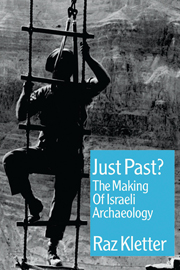Book contents
- Frontmatter
- Dedication
- Contents
- List of illustrations
- Introduction
- Acknowledgements
- Abbreviations
- 1 Archaeology and the 1948 War
- 2 Abandoned places, new places
- 3 Foreign aid
- 4 Frozen funds
- 5 A battalion of guards
- 6 Relief work
- 7 Man robs his land: “agreement” with General Dayan
- 8 “Gold of Ophir for Beth-Horon”: 3,000 shekels
- 9 The building beyond the border: the PAM, 1948–67
- 10 A building of dreams: a home for the IDAM and the origins of the Israel Museum, Jerusalem
- 11 A dead man on the council: the story of the supreme archaeological body in Israel
- 12 “But trust comes from the heart”: travels with the Government Tourist Corporation
- 13 “Whether in a courtyard of a synagogue, in a courtyard adjacent to a synagogue, or under a synagogue”: the Safad affair
- 14 The policy of salvage and early Israeli excavations
- 15 Myths and conclusions
- Appendix: other documents from the IDAM files
- Bibliography
- Author index
- Index
7 - Man robs his land: “agreement” with General Dayan
- Frontmatter
- Dedication
- Contents
- List of illustrations
- Introduction
- Acknowledgements
- Abbreviations
- 1 Archaeology and the 1948 War
- 2 Abandoned places, new places
- 3 Foreign aid
- 4 Frozen funds
- 5 A battalion of guards
- 6 Relief work
- 7 Man robs his land: “agreement” with General Dayan
- 8 “Gold of Ophir for Beth-Horon”: 3,000 shekels
- 9 The building beyond the border: the PAM, 1948–67
- 10 A building of dreams: a home for the IDAM and the origins of the Israel Museum, Jerusalem
- 11 A dead man on the council: the story of the supreme archaeological body in Israel
- 12 “But trust comes from the heart”: travels with the Government Tourist Corporation
- 13 “Whether in a courtyard of a synagogue, in a courtyard adjacent to a synagogue, or under a synagogue”: the Safad affair
- 14 The policy of salvage and early Israeli excavations
- 15 Myths and conclusions
- Appendix: other documents from the IDAM files
- Bibliography
- Author index
- Index
Summary
INTRODUCTION
Gabriel Garcia Marquez (1967: 106–7) describes the glorious Colonel Aureliano Buendia, who organized 32 rebellions, had 17 children with different mothers and survived 14 murder attempts and 73 ambushes; the only thing left was a street named after him in Macondo. Almost every major city in Israel has a street named after Moshe Daya, a general and politician with enormous status and influence. Born in May 1915, he was jailed by the British authorities in Accho in 1939, lost an eye in an operation in Syria in 1941, served as commander of an army division during the 1948 War, and was head of the Jerusalem Front. In October 1949 he was appointed Commander of the Southern Front, and in December 1952 Chief of Operations at General Headquarters. From 1953 to 1958 he was Chief of Staff, leading the army to – and during – the 1956 War. After a short year of studies at the Hebrew University of Jerusalem, Dayan was elected to Parliament and became Minister of Agriculture (1959–64). On the brink of the 1967 War he was appointed Minister of Defence, and the 1967 victory turned him into a national hero. He held this post until 1974, after the shattering crisis of the 1973 War. Although many Israelis blamed him for it, he prospered by deserting the Labour Party to join Begins government in 1977 as Foreign Minister.
- Type
- Chapter
- Information
- Just Past?The Making of Israeli Archaeology, pp. 150 - 164Publisher: Acumen PublishingPrint publication year: 2006



